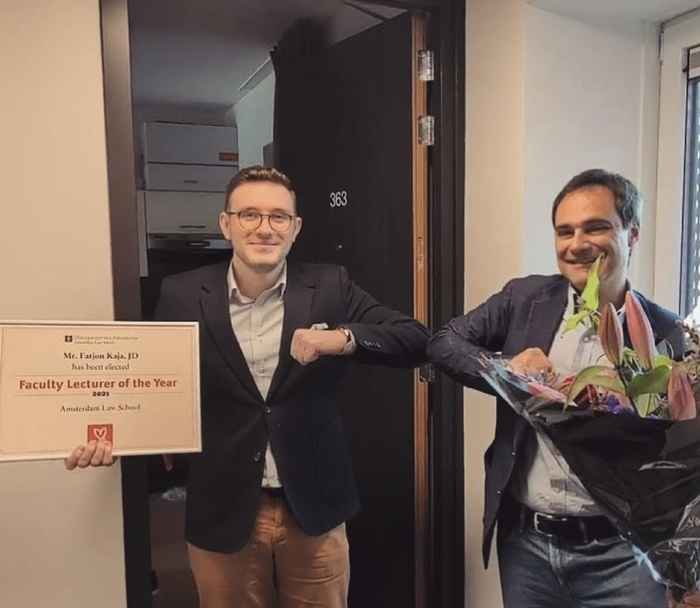Fatjon Kaja Lecturer of the Year 2021
Amsterdam Law School
7 June 2021

Congratulations on your nomination! What do you think of this?
‘Given the vast number of wonderful academics at Amsterdam Law School, I am elated at the news. Although my name is the one to be recognized, it would not have been possible for my classes to run smoothly without the help of my entire colleagues at the Amsterdam Center for Law and Economics, who have been very supportive in terms of logistics and curriculum development. Hence, I like to think of the award as a recognition of all those efforts.’
Students praise you for your commitment and helpfulness, even outside classes. Do you recognize this? Why do you think this is important?
‘I encourage students to reach out all the time. Given that most of my students are at a point in their lives where they are experiencing a lot of uncertainty on who they are or who they want to be, I think it is important for them to have an open door where they can seek advice. I am cognizant of the fact that I, myself, would not be where I am today without the enormous help and dedication that my professors gave to me, both at The City College of New York and the University of Minnesota Law School.’
I am cognizant of the fact that I, myself, would not be where I am today without the enormous help and dedication that my professors gave to me
They also mention your 'socratic' way of teaching, and the way you use anecdotes to illustrate your story. Is this what typifies your style?
'I think so. Since the courses in the Minor in Law & Economics are designed similarly to law school courses in the US and are promoted as such, then it is only fair that students also experience the Socratic method of teaching. This is a standard method at all American law schools. I try to steer away from emulating the nefarious Professor Kingsfield, because I find that approach to education counterproductive. Nonetheless, I like to press students on their views, because I like to teach the students to hold their grounds in an argument. Lastly, I use anecdotes to break down complex topics, but also to relate the material to daily life, so students understand that we are not learning some obscure theoretical concept that they will never hear about it after finishing my classes.'
What do you do when students are unmotivated?
'Science is my secret here. When I entered college, I vacillated between a career in science and one in economics. Although I chose to do the latter, some key things that I learned in science still drive me. For example, the first law of thermodynamics states: energy cannot be created or destroyed in an isolated system. As such, I approach every class full of enthusiasm and positive energy, as I want my students to feel invigorated and ready to take on the most challenging tasks of our society. And, if Mr. Newton is right, then I should also expect the counterreaction to be the same, which in turn makes teaching an enjoyable endeavor.'
Can you give an example of something notable that happened during one of your lectures?
'When I designed the syllabus for one of the courses, I picked two particular cases (Laidlaw v. Organ; US v. Carroll Towing Co.) because I thought students in the Netherlands would really feel familiar with the topics, because one of them deals with a windmill and the other with ships. As the meme goes, I have never been so wrong in all my life.'
What do you enjoy most about teaching?
'It is that amazing feeling when you look students in the eye while you lecture and somehow you realize that it clicked for them, which means that they grasped the point you were making. My colleagues will know what I am talking about.'
About Fatjon Kaja
Fatjon Kaja is a lecturer in Law & Economics at the Amsterdam Law School and is associated with the Amsterdam Center for Law and Economics. He holds a Bachelor of Arts and a Master of Arts degree in Economics from The City College of New York - CUNY, and a Juris Doctor degree from the University of Minnesota Law School.